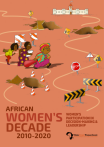African Women's Decade 2010-2020 Annual Review
MEWC's report summarises the progress made by African countries regarding women's rights and gender equality on the continent during the first year of the African Women's Decade.
This is done by presenting each country on the continent with a background and a presentation of progress and developments made within different areas, with importance for the human rights of women and gender equality. The report is divided into sections according to regional visions of the African continent, and the countries are then presented individually.
MEWC will publish one report yearly throughout the 10-year duration of the African Women’s Decade. The purpose of the report is to provide an overview of women's rights situation in Africa. It is important to keep track of countries progress with regards to gender equality in Africa for several reasons. It is a way of keeping track of the progress made on the continent and will thus function as a resource for developments throughout the decade. It is also an important tool when advocating for change, as developments regarding progress on gender issues will be made available. Furthermore, the report can function as an incentive for countries to improve their efforts in the areas of gender equality and the human rights of women.
PS: For the last 3 years, we have been doing these reports without any financial help. As an organisation runs entirely by volunteers, monitoring all 54 Africans countries is a lot of work. In order for us to continue doing our work, we need your help. Please consider Donate Now to keep us going or if you would like to help us getting financial help, please get in touch at: This email address is being protected from spambots. You need JavaScript enabled to view it.
Many thanks
Considering that equal access of men and women to power is a necessary precondition for democracies to flourish, our 2017- 2018 report focuses on women’s role in decision-making and leadership in key positions and at all levels. Nowadays, women leaders have an enormous potential to influence decision-making, by promoting fairer policies and practices in governments, parliaments, the judiciary and the private sector. Even though women play a crucial role in all the above fields, previous reports have mainly focused on women in governments and parliaments. In other words, this report goes beyond limitations and seeks a holistic approach with regard to women’s participation in all spheres of decision-making such as women MPs, women ministers, women in the judiciary, women in the private sector. Read the full report here

Just few years ago in December 2008, a proposal for an Africa Women’s Decade (2010-2020) was initiated by the African Union (AU) Ministers for Gender and Women Affairs at their meeting held in Maseru, Lesotho. The idea was adopted in February 2009 by the AU at the 12th Ordinary Summit of Heads of State and Government, in Addis Ababa, Ethiopia. As we are now halfway- into the African Women’s Decade, it is time to ask ourselves; ‘Where are we now in terms of women’s rights on the continent? read more...
Four years since the launch of the African Women’s Decade 2010-2020, African Women’s rights activists and organisations have a lot to be proud of. Thanks to their efforts, there have been some important strides in terms of legislation, education, and the presence of women in decision-making across the continent. The year 2014 was a significant year in terms of legislation changes for institutional support to facilitate healing and justice for women survivors of sexual violence. read more...
The year 2012 has thus far proved promising for the African woman's status within public bodies. Women are beginning to break the political glass ceiling in many countries and finding their way in roles traditionally occupied by men. According to the 2012 data from the Inter- Parliamentary Union, women occupy 20.2% of parliamentary seats in Sub-Saharan Africa, which is slightly higher than the world average of 19.5%. read more...
